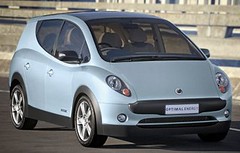South African bloggers were among the first to report on South Africa's first electric car. On the blog Urbasprout, Glen was among the first people to post pictures of the car and detail on the company that made the car, the designer, design specifications and expected availability dates. 
Battery range has previously been the biggest limiting factor with electric cars, but that looks set to change. The Joule will sport two lithium ion battery packs that will ensure the car has a range of 400km. The recharge time will be approximately 7 hours so it can be charged over night. Regenerative braking, where the battery is charged by the energy generated in braking, will add to the car's range.
As for where the car will be manufactured, Glen notes that:
Predictions are that 50 percent of the Joule's materials will be local and that it should be available towards the end of 2010 at a cost of R200 000. It is likely to be manufactured in Gauteng, but will also be available in Durban and Cape Town.
Laura of the Treevolution blog points to the IOL story, highlighting the description of the car by Edwin Naidu
a compact six-seater that looks like an uncluttered mix of a Renault Scenic and a Citroen Picasso
She notes that the general public will have to wait until the Paris Motor show in October to see the electric car.
Carl of Greencars.za.net adds more detail on the Joule, answering important questions regarding the availability of electricity to power electric cars in South Africa.
Independent analysis of Eskom, the country’s sole electricity provider, has confirmed that the South African grid has enough capacity to supply electrical energy to millions of cars without affecting its customer base or requiring any additional infrastructure. Eskom has vast amounts of excess energy between 11 PM and 6 AM (GMT +2); this will be the recommended recharging time. Electric cars only require about 20 percent of the energy that conventional cars require; this means that the total emissions are much less, even if Eskom’s coal dominated electricity is used. With the global trend of electricity generation becoming more renewable and cleaner, total emissions caused by electric cars will continue to shrink.
He also includes more information regarding the cars’ battery, brakes, body, chassis, integrated vehicle computer, propulsion system, performance styling and suspension.
Last but not least, Rory of Carbon smart reminds readers that the factors that ‘killed the electric car decades ago’ are still in play. He wonders how far this local initiative can get. He considers the recent article by wired magazine about Shai Agassi's model of selling electric cars. Rory points out that this model deals with the power storage problem that prevents wider adoption of electric cars.
Power storage is the biggest technical issue preventing rapid adoption of electric vehicles – primarily the weight of batteries, and the recharge time – and that's what this proposal addresses. The gist of it is that companies could be set up to sell electricity along with the cars. Buy yourself a contract that allows you to recharge your vehicle from a grid of power points, or simply by swapping batteries. The batteries are owned by the power supplier, making a battery swap an easy way to eliminate recharge time if you need to extend your travel range over one day, thereby eliminating the need for a costly backup internal combustion engine. And if you are not travelling far, you can keep fewer batteries on board to reduce weight. The car itself could even be free with a five-year contract for people who travel a lot, while others might buy the car and get electricity on a pay-as-you-go arrangement. Sound familiar? Yep, it's the cellphone contract model.







2 comments
Nice to know that Africa has developed such a vehicle,means our technology is improving but the challenges include the 400 km range and the rechargeable time of 7 hours.
http://www.autobazaar.co.ke
http://www.autotalk.co.ke